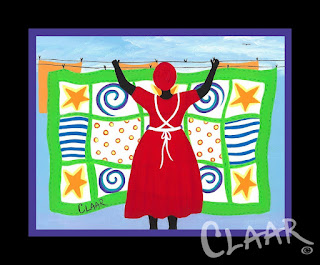In a wonderful coincidence for Black (ART) History Month, our local PBS channel featured a documentary on the Gullah/Geechee American descendants, who traveled to Sierra Leone, Africa. It was a wonderful opportunity to learn of their ancestors. Also, to share in the ancient crafts that were shared links to all of them.It fit perfectly with today's subject.
The West African crafts included art (last week's blog), clay, weaving and calabash containers. What has passed down through in the United States, in particular, is sewing quilts from cotton scraps and sweet grass basket weaving.
Traditionally, when a man could no longer do the arduous work in the fields, he would contribute to his people by weaving the large baskets needed for sowing and harvesting. In time, the Gullah women began to weave small baskets for storing and serving food. Each family has a signature method of weaving which was handed down from mother to daughter.
These smaller baskets became a collectible art sold to traveler. In fact, today there's a stretch of Highway 17 just North of Mt. Pleasant, SC given the title "Sweetgrass Basket Highway" where you can visit the stands and watch the basket being woven.
When it came to quilting, Gullah/Geechee quilting was a way of telling a story. In this case, since women usually made the clothes, the knowledge and tradition flows through the females. It's a "strip quilting" method still used on looms in parts of Western Africa. As you look at the quilts, you can see the use of the fabric strips, which is very different from the European method of using small squares.
Many of the quilt stories are personal to the history of the family, while others are a pictorial history of the people. This woman stands next to her quilt with scenes from the pyramids of Egypt through the trials of slavery and beyond.
They were torn away from their homeland to work along the Southeastern coastal region of the USA. Why? Because they had been growing rice in similar soil conditions in West Africa. They taught the plantation owners/managers how to do it.
They were treated barbarously. Yet, generations later, they still maintain a memory of their ancestry.
The Gullah/Geechee people are a living statement as to the resilience and determination of the soul.










No comments:
Post a Comment